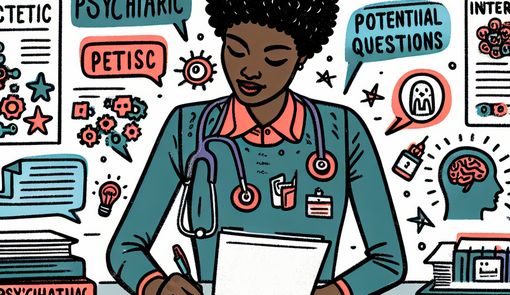The Job Market for Psychiatric Nurse Practitioners: Trends and Opportunities

The healthcare industry is continually evolving, responding as it must to changes in society, advances in medicine, and the shifting dynamics of patient needs. One area that has seen rapid growth and change is mental health care. Amid these changes, the role of Psychiatric Nurse Practitioners (PNPs) has risen in significance, casting these specialized practitioners into a more pivotal position than ever before. Understanding the job market for Psychiatric Nurse Practitioners requires a close look at the current trends, opportunities, and challenges within the field of mental health care. In this article, we will explore these aspects in-depth.
Understanding Psychiatric Nurse Practitioners
Before diving into the job market, it's crucial to define what a Psychiatric Nurse Practitioner is. PNPs are advanced practice registered nurses (APRNs) who have specialized education and training in psychiatry and mental health. They are authorized to diagnose mental illnesses, conduct therapy, and prescribe medications for their patients. With a scope of practice that sometimes overlaps with that of psychiatrists, they fill a critical gap in mental health care services.
Current Trends in Mental Health Care
Mental health care has undergone a transformation in the last decade. With increased awareness and destigmatization of mental health issues, there has been a surge in the number of people seeking help. The integration of technology through telemedicine has also expanded the reach of mental health services, allowing PNPs to treat patients remotely, which has become particularly valuable amid the constraints imposed by the COVID-19 pandemic. Additionally, the increased emphasis on holistic and integrated care models has encouraged collaboration between PNPs and other healthcare providers.
Another trend is the growing recognition of mental health in various community settings, including schools, workplaces, and within the criminal justice system, demanding a broader presence of mental health experts in these areas.
Workforce Statistics and Demand for PNPs
Statistics indicate a critical shortage of mental health providers in the United States, which disproportionately affects rural areas and underserved communities. The Health Resources and Services Administration (HRSA) has identified mental health provider shortage areas across the country, presenting opportunities for PNPs willing to serve in these regions.
Moreover, the American Association of Nurse Practitioners (AANP) reports that only a small percentage of nurse practitioners specialize in psychiatry. However, demand for psychiatric services continues to rise, creating a seller's market for PNPs, with many receiving multiple job offers and attractive compensation packages.
Educational Requirements and Specializations
PNPs must obtain a Master's of Science in Nursing (MSN) or a Doctor of Nursing Practice (DNP) degree, with a specialization in psychiatric-mental health. They must then pass a national certification exam to practice. This depth of education equips them with the expertise to handle complex mental health conditions and offer comprehensive care.
Job Opportunities for PNPs
The job market for PNPs is robust and diverse. They can practice independently in some states, collaborate with psychiatrists in others, or work in hospitals, outpatient clinics, substance abuse treatment centers, correctional facilities, and private practice. The Veterans Administration (VA) is also a significant employer of PNPs due to the high prevalence of PTSD and other mental health issues among veterans.
In terms of job growth, the Bureau of Labor Statistics (BLS) projects the employment of nurse practitioners to grow much faster than average for all occupations from 2019 to 2029. While this figure includes all nurse practitioners, the demand for PNPs is likely to be even higher given the mental health service gap.
Salaries and Compensation
With the high demand for psychiatric services, PNPs often command competitive salaries. According to the AANP, median salaries for nurse practitioners, including PNPs, are upwards of $100,000 annually, with variations based on location, experience, and setting.
Challenges and Considerations
One of the challenges facing PNPs is the variation in practice authority from state to state. Some states have full practice authority for nurse practitioners, while others require physician supervision or collaboration. This can limit the potential for PNPs to practice to the full extent of their training.
Another issue is mental health parity. Despite laws requiring equal coverage for mental health care, enforcement is patchy, potentially affecting the financial viability of services provided by PNPs.
Future Outlook
Looking ahead, the job market for PNPs appears promising. The continuing destigmatization of mental health issues, advances in treatment, and the embrace of integrated health models point to a burgeoning need for their services. Legislation enhancing nurse practitioner practice authority and mental health parity could further boost the role of PNPs in the healthcare system.
Conclusion
The job market for Psychiatric Nurse Practitioners is influenced by a dynamic interplay of trends, opportunities, and challenges. With rising public awareness, technological integration, and clinical demand, the opportunities for PNPs are substantial and growing. However, navigating this field also means dealing with legal variances and ensuring parity remains a priority. Nonetheless, for those passionate about mental health and looking for an impactful and rewarding career, becoming a PNP presents a compelling pathway.
Frequently Asked Questions
What are the educational requirements to become a Psychiatric Nurse Practitioner (PNP)?
To become a PNP, individuals must obtain a Master's of Science in Nursing (MSN) or a Doctor of Nursing Practice (DNP) degree with a specialization in psychiatric-mental health. After completing their degree, they need to pass a national certification exam to practice.
Where do Psychiatric Nurse Practitioners (PNPs) typically work?
PNPs can practice independently in some states, collaborate with psychiatrists in others, or work in various settings such as hospitals, outpatient clinics, substance abuse treatment centers, correctional facilities, private practice, and the Veterans Administration (VA).
What is the demand like for Psychiatric Nurse Practitioners (PNPs) in the current job market?
There is a growing demand for PNPs due to the critical shortage of mental health providers in the United States. PNPs are particularly sought after in underserved communities and rural areas. The demand for psychiatric services is rising, creating a favorable job market for PNPs with competitive salaries and multiple job offers.
Are there any challenges in the practice of Psychiatric Nurse Practitioners (PNPs)?
One of the challenges PNPs face is the variation in practice authority regulations from state to state. While some states grant full practice authority, others require physician supervision or collaboration, limiting the scope of practice for PNPs. Additionally, the enforcement of mental health parity laws can impact the financial aspects of services provided by PNPs.
What is the future outlook for Psychiatric Nurse Practitioners (PNPs) in the healthcare industry?
The future outlook for PNPs is promising, given the increasing awareness of mental health issues, advancements in treatment options, and the shift towards integrated health care models. Legislation that enhances nurse practitioner practice authority and ensures mental health parity could further elevate the role of PNPs in the healthcare system.
Further Resources
For further exploration on the job market for Psychiatric Nurse Practitioners and related topics, here are some valuable resources:
- American Psychiatric Nurses Association (APNA)
- APNA Website: The APNA offers a variety of resources, education, and networking opportunities for psychiatric nurses, including conferences and webinars.
- National Alliance on Mental Illness (NAMI)
- NAMI Resource Library: NAMI provides a wealth of information on mental health conditions, treatment options, and advocacy resources.
- American Association of Nurse Practitioners (AANP)
- AANP Psychiatric-Mental Health Nursing Specialty: Explore the latest updates, research, and events related to psychiatric-mental health nursing.
- Health Resources and Services Administration (HRSA)
- HRSA Behavioral Health Workforce Education and Training Program: Learn about HRSA grants and programs aimed at addressing workforce shortages in behavioral health.
- Bureau of Labor Statistics (BLS)
- BLS Nurse Practitioners Occupational Outlook: Access the latest data on job outlook, salaries, and educational requirements for nurse practitioners.
- National Institute of Mental Health (NIMH)
- NIMH Research and Statistics: Stay informed about the latest research findings and initiatives in mental health from NIMH.
- American Nurses Association (ANA)
- ANA Mental Health Resources: Explore ANA's position statements and resources on mental health nursing practice.
- Substance Abuse and Mental Health Services Administration (SAMHSA)
- SAMHSA Training and Education: Access training materials, webinars, and evidence-based practices for mental health and substance abuse treatment.
Continuously expanding your knowledge and staying informed about developments in psychiatric nursing and mental health care will enhance your understanding and effectiveness as a Psychiatric Nurse Practitioner.






